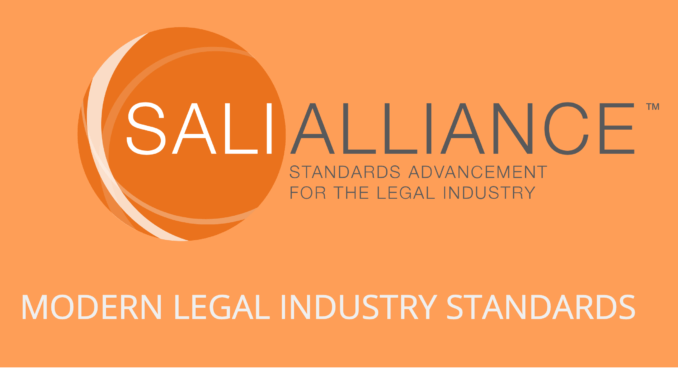
In a significant move, the Standards Advancement for the Legal Industry (SALI) Alliance has announced the addition of the International Legal Technology Association (ILTA) to its list of managing members.
The development of standard taxonomies across the legal sector may be a key component in driving greater efficiency across the market, and so to have ILTA, the largest legal tech organisation in the world, come in is significant. And, if SALI can gain even more momentum we could perhaps be looking at the beginning of a new era in the industry, where the drive for standardisation becomes the norm, rather than the exception.
The Legal Marketing Association (LMA) and the Association of Legal Administrators (ALA) are also already both members of SALI as well.
Of course, that there are organisations pushing for standardisation is one thing – whether the majority of the world’s leading firms will adopt this approach remains to be seen. But, this is at least a significant step forward.
SALI was formally established in May 2017 and has the development of a Legal Matter Specification Standard (LMSS) as its core focus at present.
The LMSS is comprised of three parts:
- Code Sets — There are more than a dozen standardised code sets that define the ‘common language’ for describing different aspects of legal matters.
- A Structure — The LMSS structure is a database format that defines how the codes, descriptions and values relate to each other.
- APIs — The programming interfaces provide a way to easily support and implement the standard.
Setting standards across the ‘business of law’, as opposed to ‘the law’, is a growing subject, especially among those focused on the work processes of law firms. Many see the legal market as highly disconnected and not sharing common standards for a range of issues, which creates additional costs for law firms and their clients.
Recently we have seen Microsoft implementing some of SALI’s standard taxonomy for legal matters, which they hope will help the company match legal matters with in-house lawyers or outside law firms, they have said. And that’s just the start of it. But, it makes sense to begin with the basics, i.e. the different kinds of work products that lawyers make.
After all, we can’t have a truly transparent economic approach to the production of legal work until we can at least identify the products that are made. After that we can then look at things like cost normalisation, and then explore setting production standards for each of those legal products.
The end result, as with any aspect of industrialisation, is greater efficiency, lower production costs and generally a more transparent market.
Here is what SALI says about its goals: ‘Whether you are revamping your matter intake process or preparing data for an advanced workflow, you need a solid taxonomy to profile your information. Most law firms and corporate legal departments have coding systems that have grown over the years and are difficult to use because they usually conflate some combination of practice, process, industry and product.
‘You can use the LMSS, which has been normalised to separate these different aspects of matters. There is no need to reinvent the wheel. And because LMSS has an extension mechanism, you can extend the codes to meet your organisation’s need if they are not as specific as you need.’
And, they add: ‘To understand the work your firm or legal department has done in the past to better understand pricing and project resource parameters, you need to develop an experience database to review your past work. If you don’t have a good model for that database, start with the LMSS structure to develop or modify your system.’
This all looks like a great project and Artificial Lawyer is 100% in support of it. Until we can apply some transparency and logic to the manufacturing process involved in the legal sector then significant change will always be held back.
As they say: you can’t change what you don’t measure. And, you certainly can’t compare legal products if you can’t even identify them within a structured framework.
In turn, this approach opens the door to more and better use of tech, from pricing and cost prediction systems, to hopefully supporting a more standardised approach to core legal documents in each major legal jurisdiction.
Toby Brown, SALI Board Member, and chief practice management officer at Perkins Coie, said: ‘This is an exciting moment for SALI. We formed SALI to be inclusive to all industry stakeholders. ILTA’s signing on as an active member demonstrates our momentum and reinforces the unique value that SALI is bringing to the industry for standards development and modernization.’
‘ILTA is pleased to partner with SALI in order to help establish industry standards that will promote consistency across the legal field,’ said Joy Heath Rush, ILTA’s chief executive officer. ‘Formalized standards are effective in improving the quality of services rendered and aid in keeping costs low. We are excited for this opportunity and look forward to working together.’
—
Any company or organisation can become a member at www.sali.org. Members can participate in defining the legal services market through regular SALI Alliance standard committee meetings. Membership tiers are available for clients, law firms, solution providers and other industry stakeholders.
The SALI Alliance has as members ALA (founding member), LMA (founding member), ILTA (founding member), Allen Matkins, Barnes & Thornburg, Bloomberg Law, Cox Automotive, GSK, Goulston & Storrs, Greenberg Traurig, Honigman, Miller, Schwartz and Cohn, Humana, Intapp, King & Wood Mallesons, Level 2 Legal Solutions, Lexis, McKool Smith, Mishcon de Reya, Pepper Hamilton, Perkins Coie, Prosperware, Schulte Roth, Shearman & Sterling, Shell.
How does this sit alongside Reyna Court Chris? Path of convergence?